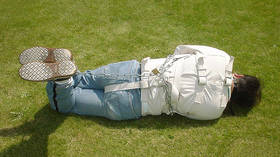Snopes roasted after posting 'study' claiming 28% of Republicans think Babylon Bee articles are real

“Fact-checking” site Snopes has been vindicated in its decision to fact-check satire by a study proving people (especially Republicans) often mistake satirical site Babylon Bee for real news. Or has it? Claim rated: mostly false.
The “five most-believed satirical claims by the Babylon Bee” fool up to 28 percent of Republican readers, according to a study conducted by the Conversation (and credulously reposted by Snopes). The study’s conclusions appeared at first glance to validate Snopes’ much-mocked decision to fact-check obviously satirical stories by the Bee – clearly, Snopes’ detractors simply didn’t realize how many people were incapable of recognizing political satire!
That survey @snopes shared is horrible. Did they seriously paraphrase Bee stories and ask people if they thought they were true? That's an awful way to figure out what percentage of people will believe satire. pic.twitter.com/tDHnTx4h41
— Kyle Mann (@The_Kyle_Mann) August 16, 2019
But the researchers didn’t present their subjects with Babylon Bee headlines and ask them if they thought they were looking at real news. Instead, they paraphrased the “false claims,” ironing out the satire in a way that – ironically – made them look more like real news, as the Bee’s own editor in chief pointed out.
Also on rt.com Man charged with felony over cop-mocking Facebook page allowed to sue copsThe study didn’t focus entirely on the Bee – the Onion got the same paraphrasing treatment, and up to 14 percent of Democrats believed some of its claims (including one story in which National Security Advisor John Bolton calls an attack on Saudi oil tankers “an attack on all Americans,” which – let’s face it – wouldn’t look out of place in the Washington Post). And its conclusions were reasonable enough, suggesting fact-checking sites label satire as satire, instead of “false.”
But the post revived the ongoing battle between the Bee – whose humor leans conservative – and Snopes – whose “fact-checking” leans liberal – and inflamed Twitter as people on both sides wondered who, exactly, was taking Bee stories like “CNN purchases industrial-size washing machine to spin news” seriously. Besides Snopes, which fact-checked that story last year.
Sometimes satire is easy to spot, says Snopes, sometimes not, which is apparently why they fact checked whether CNN actually purchased a wash machine to spin the news. pic.twitter.com/AwJMIrXlac
— Molly Ratty (@molratty) August 16, 2019
“Even by Snopes standards this is hopelessly desperate and depraved,” one user tweeted. Several tore into Snopes as “fake news,” calling its “vicious and bizarre war” against the Bee “beyond parody.”
Study: Too Many People Think Snopes Fact Checking is Real
— Cry, Onions (@cryonions) August 16, 2019
Many reposted their favorite Bee headlines, and made suggestions for other stories Snopes could fact-check.
Not gonna lie. I fell for this one. pic.twitter.com/1k0fnjBQHn
— Joe Pontillo (@JoePontillo) August 16, 2019
Given @snopes recent history of fact-checking fake news from @TheBabylonBee, I found 4 recent stories on their site that people could definitely confuse with the truth. Can #Snopes please fact check these? pic.twitter.com/iooS6o8F6o
— Fr. Matthew P. Schneider, LC (@FrMatthewLC) August 17, 2019
Snopes thinks Spinal Tap is a real band and Brawndo is a real sports drink. https://t.co/x9UyQcdHom
— Sean Davis (@seanmdav) August 16, 2019
Others called Snopes out for political bias, pointing out that “the Onion has been doing this same thing since 1988 and your ‘unbiased’ fact checking website has chosen to critique a 3 year old satire outlet as problematic instead.” Several accused the outlet of trying to get the Bee deplatformed.
Snopes did finally capitulate to common sense and create a “labeled satire” rating earlier this month for sites like the Bee after getting slammed for “fact-checking” a satirical article about a Georgia lawmaker mishearing “my pleasure” as “go back to your country,” but the partisan rivalry refuses to die. Critics argue the new label smears satirical content by suggesting it isn’t “real” satire.
Like this story? Share it with a friend!














